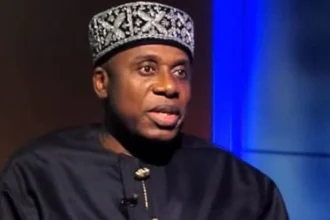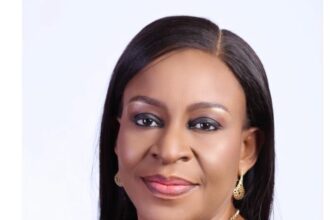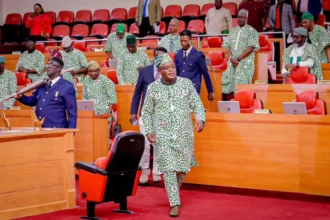...To get all news updates, Join our WhatsApp Group (Click Here)
Also Join our WhatsApp Channel (Click Here)
Traditional rulers are gradually but increasingly getting involved in political activities under various guises, even as they are expected to be neutral.
In the run-up to 2011 general elections, Imo State Council of Traditional Rulers put up an action that many interpreted as an audacious incursion into the political terrain. The royal fathers had, in an unprecedented move, openly thrown their support behind the then governor, Ikedi Ohakim, one of the contestants.
Jonathan,-Ilomuanya-and-OkorochaThe traditional rulers, had, at one of their meetings at Imo Concorde Hotel, Owerri, resolved to support Ohakim’s second term bid.
In a communique signed by the then chairman of the council, Eze (Dr.) Cletus Ilomuanya; and the Secretary, Chieftaincy, Imo State, Jude Okorie, the members claimed that Ohakim had recorded unprecedented achievements in piloting the affairs of the state that he needed to be encouraged to continue in office for a second term.
The communique added that the traditional rulers in Imo were highly satisfied with the “extra-ordinary and superlative” achievements of the governor. They therefore resolved that all the traditional rulers in the state would stand by him in the 2011 governorship election.
Ohakim incidentally lost the election to the current governor, Rochas Okorocha, who ran on the ticket of All Progressives Grand Alliance (APGA). Okorocha has since ditched APGA for the All Progressives Congress (APC).
The unusual step by the traditional rulers’ body is yet to be retraced from Imo politics. If anything, the government has built on it, and, in the process, systematically tying the royal fathers to its apron strings, albeit in veiled forms.
For instance, early in the life of the administration, the governor unfolded strategies to stamp out kidnapping and other violent crimes in the state with the traditional rulers placed as Chief Security Officers of his Community Government Council (CGC) initiative.
Apparently to underscore the importance of the initiative, Okorocha vowed to interrogate and withhold the salary of any monarch from whose domain a kidnapper was detected and apprehended.
Even with foot-soldiers of the governor swearing that the move was intended to rid the state of criminals and bring governance to the people, his political opponents, however, saw the arrangement as a veiled attempt at erecting a platform with which to co-opt and coerce traditional rulers into the politics of the state.
They argue in particular that proven loyalty of a traditional ruler to the governor is a major consideration in his participation in the scheme.
Sam Onwuemeodo, the governor’s media assistant, has however denied the charge, insisting that the exercise is merely intended at taking governance to the grassroots
“That is the erroneous interpretation of the waning opposition. The idea (CGC) is to (quicken) development at the grassroots and enhance healthy competition among the communities for development,” he said.
Ideas, he stressed, are bullets, arguing that the opposition in the state has been overtaken by events.
Elsewhere, there have also been actions that have been seen as amounting to involving monarchs in politics. Recently, for example, President Goodluck Jonathan came under attack from the Olubadan of Ibadan, Oba Odulana Odugbade, over his visit to the Alaafin of Oyo, Oba Lamidi Adeyemi, without seeing him.
The Olubadan, who is the current chairman of the Oyo State Council of Obas, felt slighted that the President visited his state without first calling on him. Jonathan had, within the period, paid courtesy visits on the Oba of Lagos, the Alaafin of Oyo, the Ooni of Ife and the Emir of Kano in an unprecedented one-day traditional rulers visiting programme.
Incensed that he was ignored during the visit, Oba Odugbade described the trip as selective, and capable of jeopardising the peace and bringing the Ibadan chieftaincy institution to disrepute.
Olubadan and other members of the Oyo State Council of Obas were said to be waiting for Jonathan, hoping he would visit his palace. However, on arriving Ibadan, the President, accompanied by Governor Abiola Ajimobi, drove straight to see the Alaafin.
The action, according to the Secretary of the Oyo State Council of Obas, showed that Ajimobi still recognised the Alaafin as the permanent chairman of the Oyo Council of Obas and Chiefs, stressing that it was contrary to the state’s Chieftaincy Law as amended in 2011, which prescribes that the chairmanship should be rotated among the Alaafin, the Olubadan and Soun of Ogbomosho every two years.
Jonathan has, however, cleared the air on the visit, stressing that he holds the Olubadan in high esteem and had no intention of ignoring him.The explanation appeared to have rested the issue.
Critics, however, fault the gradual but steady co-option of traditional rulers by high officials of federal and state governments into politics under different guises. Some particularly frown at the President’s selective visits to influential traditional rulers, interpreting the exercise as veiled attempt at initiating his 2015 campaigns from the back door. Those who reason along this line insist that the action and the royal fathers’ acquiescence run counter to the role expected of them in stabilising the polity.
Curiously, 1999 Constitution appears silent on traditional rulers’ participation in politics. Lawyers are, therefore, divided on whether the royal fathers should participate in the game in any way.
Monday Ubani, chairman, Nigerian Bar Association (NBA), Ikeja, Lagos, for instance, argued that it is only in monarchical arrangement that traditional rulers have defined role in politics, but not in a presidential democracy as being practised in Nigeria. In the latter system, he said, the role of the royal fathers is essentially advisory.
Similarly, his colleague, Abdulazeez Ibrahim, who spoke from Kaduna, emphasised that the Constitution does not have provision for traditional rulers’ participation in politics, adding that allowing them to join in the fray would widen the scope of ethnic politics in the land.
Two other lawyers, who asked not to be mentioned, told our reporter that the prescription of traditional rulers’ non-involvement in politics is basically a moral issue that has no constitutional backing. They argued that given that the traditional rulers are held as fathers in their respective communities, they are not expected to be overtly affiliated to any political organisation.
Incidentally, participation of the royal fathers in politics, though under various guises, is not a recent phenomenon. During the colonial era, precisely under the Indirect Rule system, emirs were directly involved in administration of Native Authorities and Emirates, especially in collection of taxes in the North. Warrant chiefs performed similar roles in the East, and Obas in the West. The arrangement, to some extent, obtained even after the country’s Independence. Even without professing alliance to any political affiliation, the royal fathers were known to have allied with the ruling parties in their states. Some perceived to be recalcitrant or of doubtful loyalty were visited with different kinds of punishment ranging from suspension to, in extreme cases, dethronement.
Analysts, thus, see the current romance by traditional rulers with government at state and federal levels as mere survivalist strategy to keep their job.
By: Emeka Alex Duru
You can get every of our news as soon as they drop on WhatsApp ...To get all news updates, Join our WhatsApp Group (Click Here)
Also Join our WhatsApp Channel (Click Here)









